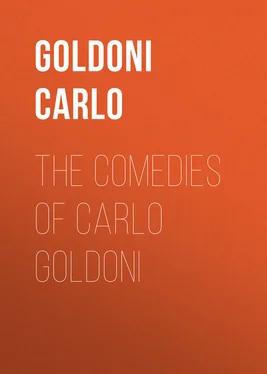Carlo Goldoni - The Comedies of Carlo Goldoni
Здесь есть возможность читать онлайн «Carlo Goldoni - The Comedies of Carlo Goldoni» — ознакомительный отрывок электронной книги совершенно бесплатно, а после прочтения отрывка купить полную версию. В некоторых случаях можно слушать аудио, скачать через торрент в формате fb2 и присутствует краткое содержание. Жанр: foreign_antique, foreign_prose, foreign_dramaturgy, на английском языке. Описание произведения, (предисловие) а так же отзывы посетителей доступны на портале библиотеки ЛибКат.
- Название:The Comedies of Carlo Goldoni
- Автор:
- Жанр:
- Год:неизвестен
- ISBN:нет данных
- Рейтинг книги:5 / 5. Голосов: 1
-
Избранное:Добавить в избранное
- Отзывы:
-
Ваша оценка:
- 100
- 1
- 2
- 3
- 4
- 5
The Comedies of Carlo Goldoni: краткое содержание, описание и аннотация
Предлагаем к чтению аннотацию, описание, краткое содержание или предисловие (зависит от того, что написал сам автор книги «The Comedies of Carlo Goldoni»). Если вы не нашли необходимую информацию о книге — напишите в комментариях, мы постараемся отыскать её.
The Comedies of Carlo Goldoni — читать онлайн ознакомительный отрывок
Ниже представлен текст книги, разбитый по страницам. Система сохранения места последней прочитанной страницы, позволяет с удобством читать онлайн бесплатно книгу «The Comedies of Carlo Goldoni», без необходимости каждый раз заново искать на чём Вы остановились. Поставьте закладку, и сможете в любой момент перейти на страницу, на которой закончили чтение.
Интервал:
Закладка:
The company proceeded to Venice, at that time in the last days of its glory, but dying gaily, merrily. The Venice of those days, an author of the time said, was as immersed in pleasure as in water. And above all did its inhabitants love the play. To this city, among this people, Goldoni returned, one of its own children, endowed with its nature, apt to understand its wishes and inclinations. And here, among his compatriots, he resolved not to follow the bad theatrical taste in vogue in favour of spectacular plays and scurrilous Commedie dell' arte , but to take up for Italy the task accomplished by Molière for France, and to re-conduct comedy into the right road, from which it had wandered so far.
"I had no rivals to combat," he writes, "I had only prejudices to surmount."
The first play written for unmasked actors proved unsuccessful. Goldoni was not daunted. He wrote a second. It was applauded to the echo, and he saw himself well launched upon his career as a reformer. The great obstacle to his entire success lay in the difficulty of finding actors, as the masked parts could be taken by greatly inferior players; and also by the circumstance, already pointed out to him by his critic of "Amalasunta," that an Italian playwright had to think more of pleasing his actors than his public. What Goldoni had to endure from this gens irritabilis , from their rancour, vapours, caprices, stolid and open opposition to his reform, is told with much good nature and sense of fun in his Memoirs. It can have been far from easy to endure, and no doubt often exasperated the author, though in his old age he can speak of it so calmly and dispassionately. But Goldoni, even as a young man, was wise, and proceeded slowly, first making himself and his name known and popular on the old lines, and only risking his new ideas under favourable conditions. Thus he respected the antique unities of time and action, which, after all, save in the hands of great genius, are most conducive to dramatic success, and he only infringed the unity of place to a certain extent, always confining the action of the comedies within the walls of the same town. He says, with a sagacity not common in his profession, that he should not have met with so much opposition, had it not been for the indiscreet zeal of his admirers, who exalted his merits to so excessive a degree, that wise and cultivated people were roused to contradict such fanaticism. As to the ill feeling roused by the ridicule freely showered by Goldoni upon the corrupt customs of his time, he takes no heed of it, save to redouble his efforts in the same direction. Like Molière, he had the courage to put upon the boards the defects and absurdities of his own age, not merely those of a bygone time. And his satire, though keen, is never bitter. His laugh is an honest one. As Thackeray says of Fielding, "it clears the air." His dramatic censure is considered to have been instrumental in putting down the State-protected gambling which was the plague-spot of Venice in those days, and further in giving the first death-blows to that debased survival from the time of chivalry, the Cavaliere Servente , or Cicisbeo .
Goldoni's diligence was as great and untiring as his invention was fertile. Thus once, provoked by an unjust fiasco , he publicly promised that he would write and produce sixteen new comedies in the course of the next year, and he kept his pledge, though at the time of making it he had not one of these plays even planned. And among this sixteen are some of his Masterpieces, such as "Pamela" and the "Bottega del Caffé." The theme of Pamela was not exactly his choice. He had been teased to compose a play after the novel of Richardson, then all the fashion in Italy. At first he believed it an impossible task, owing to the great difference in the social rules of the two countries. In England a noble may marry whom he likes; his wife becomes his equal, his children in no wise suffer. Not so in the Venice of that time. The oligarchical rule was so severe, that a patrician marrying a woman of the lower class forfeited his right to participate in the government, and deprived his offspring of the patriciate. "Comedy, which is or should be," says Goldoni, "the school of society, should never expose the weakness of humanity save to correct it, wherefore it is not right to recompense virtue at the expense of posterity." However, the necessity of finding themes, conjoined to this insistence on the part of his friends, induced Goldoni to try his hand with Pamela. He changed the dénouement , however, in compliance with Venetian social prejudices, making Pamela turn out to be the daughter of a Scotch peer under attainder, whose pardon Bonfil obtains.
It must not be supposed, however, that Goldoni, although he had now reached the apex of success and fame, was to find his course one of plain sailing. Enmities, rivalries, assailed him on all sides; and these, in the Italy of that date, took a peculiarly venomous character, men's ambitions and energies having no such legitimate outlets as are furnished to-day by politics and interests in the general welfare. Everything was petty, everything was personal. Goldoni's chief rival, and consequently enemy, was Carlo Gozzi, the writer of fantastic dramas, and stilted, hyperbolical dramatic fables, entirely forgotten now, which found a certain favour among the public of that day, one having indeed survived in European literature in the shape of Schiller's "Turandot." A fierce skirmish of libellous fly-sheets and derisive comedies was carried on by the respective combatants and partisans, filling now one theatre, now another, according as the taste of the public was swayed or tickled.
Annoyances with the actors, graspingness on the part of Medebac, made Goldoni abandon his company and pass over to that conducted by Vendramin, an old Venetian noble, – for in those days men of birth thought it no dishonour to conduct a theatre. He was then forty-six years of age, and had written more than ninety theatrical works. For his new patron and theatre he laboured with various interruptions, caused by political events and by his own restless temperament, until 1761, in which space of time he produced some sixty more comedies, besides three comic operas and plays written for a private theatre. And all this labour in less than ten years, and among them some of his best works, such as the trilogy of the Villeggiatura, Il Curioso Accidente , I Rusteghi , Le Barufe Chiozote , and many others, removed from changes of fashion, schools, methods, to which no public has ever been or can be indifferent, eternally fresh and sunny, filled with the spirit of perpetual youth. Notwithstanding, however, the excellence of Goldoni's dramas, the current literary rivalries made themselves felt, and there was a moment when Gozzi's Fables left Goldoni's theatre empty.
It then happened that at this juncture there came to him an offer from Paris to go thither as playwright to the Italian Comedy Company, established there under royal patronage. Was it fatigue, a desire for new laurels, a love of change, the hope of larger gains, that induced him to accept the offer? Perhaps a little of all these. In any case, he assented, binding himself for two years. He was never again to leave France. Paris fascinated him, though he regretted his lovely Venice, and a certain nostalgia peeps forth from his letters now and again. Still his social and pecuniary position was good in the French capital, he was honoured and esteemed, his nephew and adopted son had found lucrative employment there, and, added to all this, even Goldoni was growing old. His eyesight began to fail; he was often indisposed, and no longer inclined to move about and pitch his tent in various cities. A post as Italian teacher at the court brought him much in contact with the royal family. It strikes the readers of the Memoirs with some amazement to see how Goldoni could live in that society, could hear the talk of intellectual Paris, and not be aware upon the brink of how frightful a precipice all French society then hovered. He actually held the king to be adored by his subjects, and these subjects as happy as it was possible for a people to be, well ruled, kindly governed. The narrative of his life ends at the age of eighty, six years before his death, two before the outbreak of the Revolution. We have not, therefore, his impression of the storm when it broke. We only know, alas! that this light-hearted, gay old child – for a child he remained to the end – died in misery, involved in the general ruin and wreck that overwhelmed all France within that brief space of time. It was, in fact, his nephew who stood between him and starvation; for with the king's deposition had vanished the pension allowed to the aged Italian dramatist. A day after his death a decree of the National Convention restored it to him for the term of his days. The proposed gift came too late, but it honours those who voted it and him who pleaded for it, no less a person than Joseph-Marie Chénier, the poet. When the orator learned that the benevolence he invoked could no longer help its object, he again pleaded for the octogenarian, or rather that the pension should be passed on to the faithful wife in whose arms Goldoni had passed away. "She is old," said Chénier, "she is seventy-six, and he has left her no heritage save his illustrious name, his virtues, and his poverty." It is pleasant to learn that this request was conceded to by the Convention. The French, to their honour be it said, are ever ready to pay tribute to genius.
Читать дальшеИнтервал:
Закладка:
Похожие книги на «The Comedies of Carlo Goldoni»
Представляем Вашему вниманию похожие книги на «The Comedies of Carlo Goldoni» списком для выбора. Мы отобрали схожую по названию и смыслу литературу в надежде предоставить читателям больше вариантов отыскать новые, интересные, ещё непрочитанные произведения.
Обсуждение, отзывы о книге «The Comedies of Carlo Goldoni» и просто собственные мнения читателей. Оставьте ваши комментарии, напишите, что Вы думаете о произведении, его смысле или главных героях. Укажите что конкретно понравилось, а что нет, и почему Вы так считаете.












